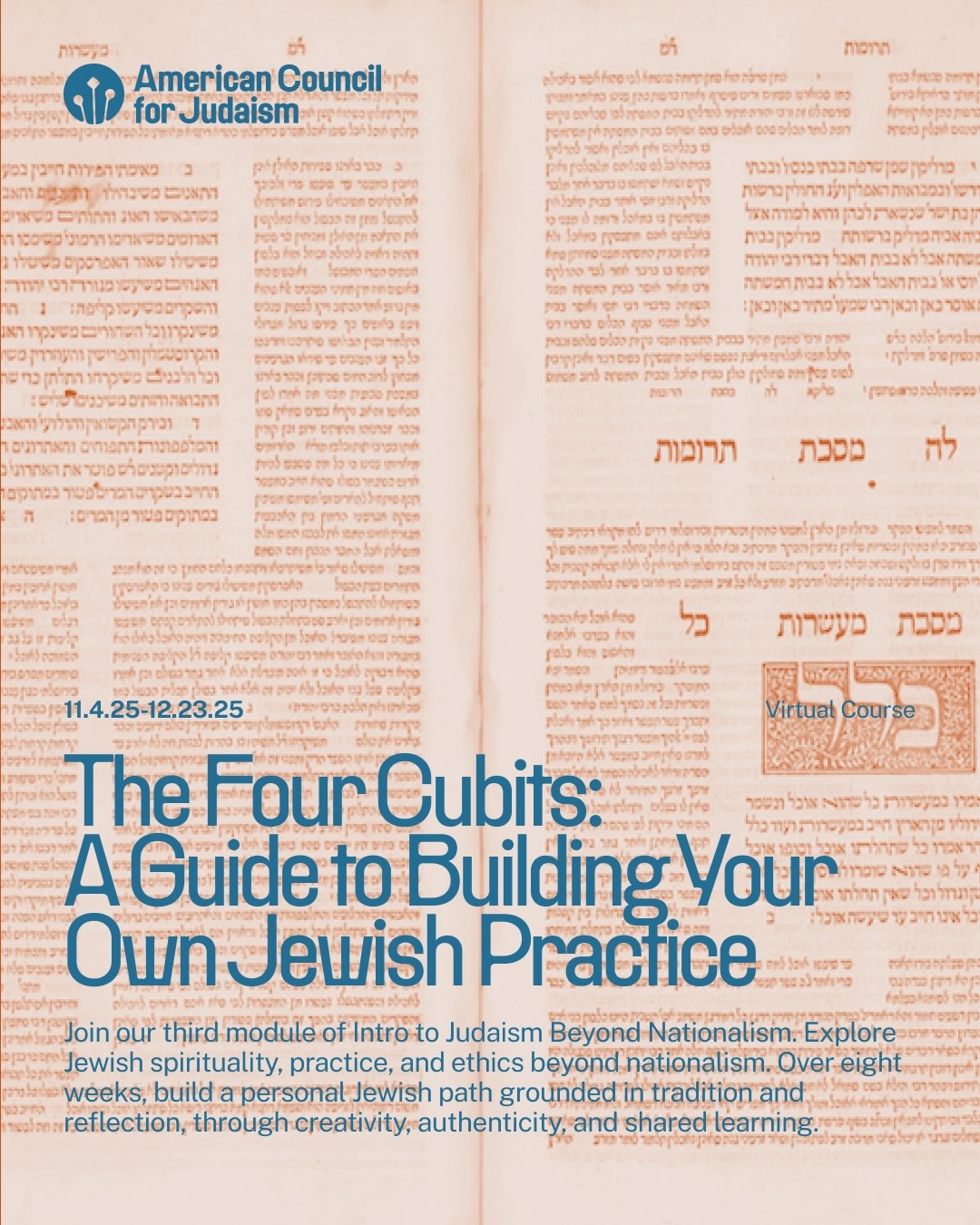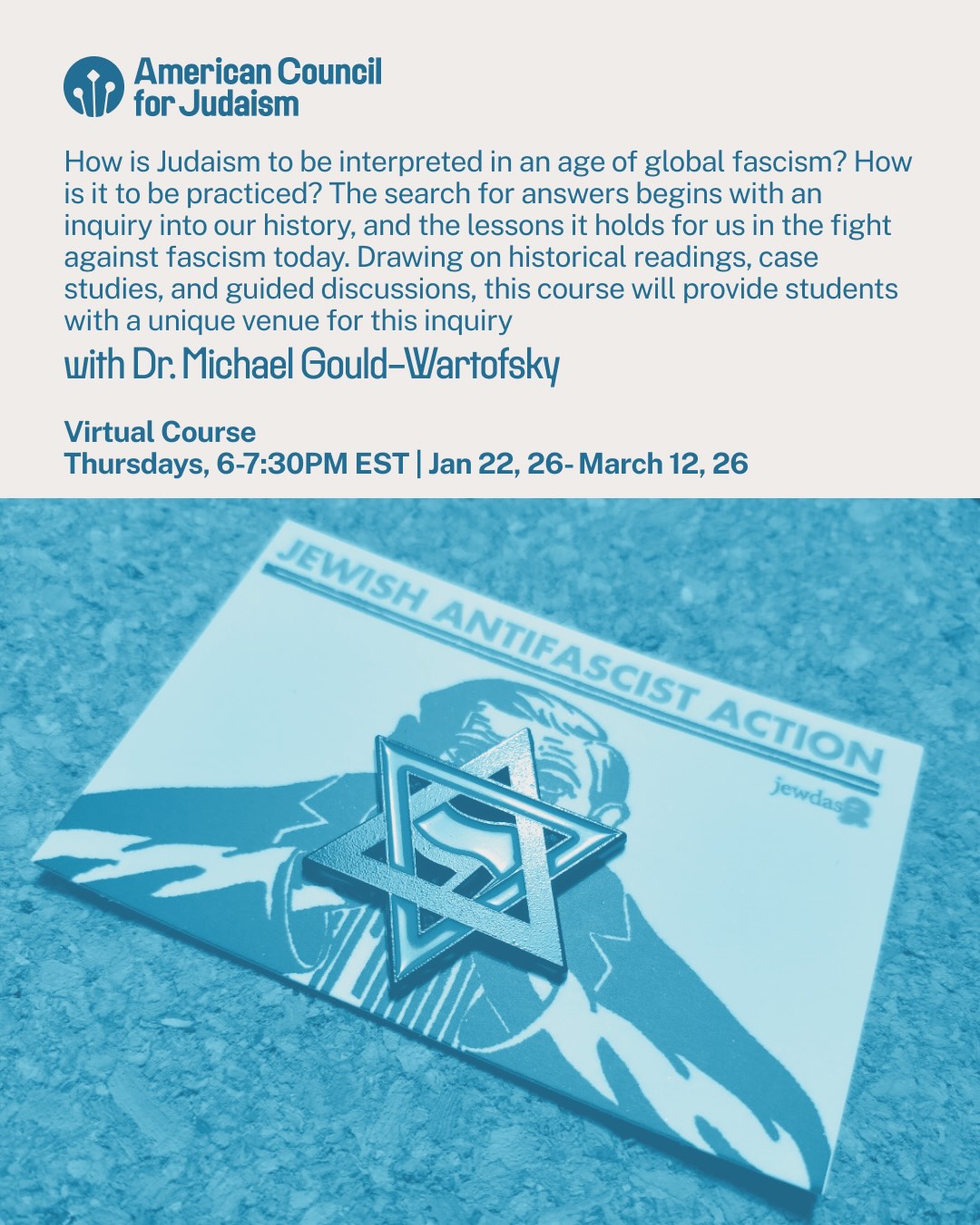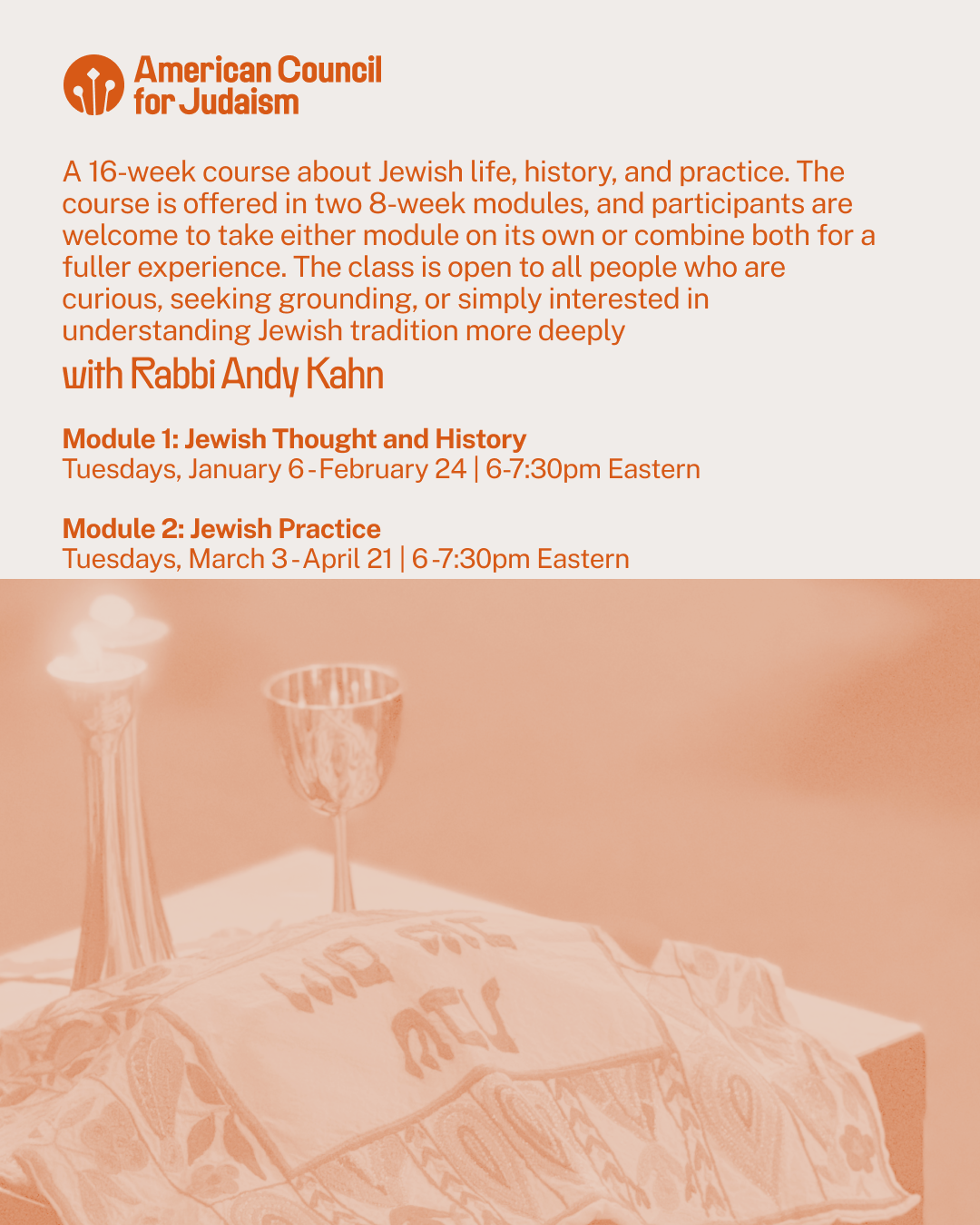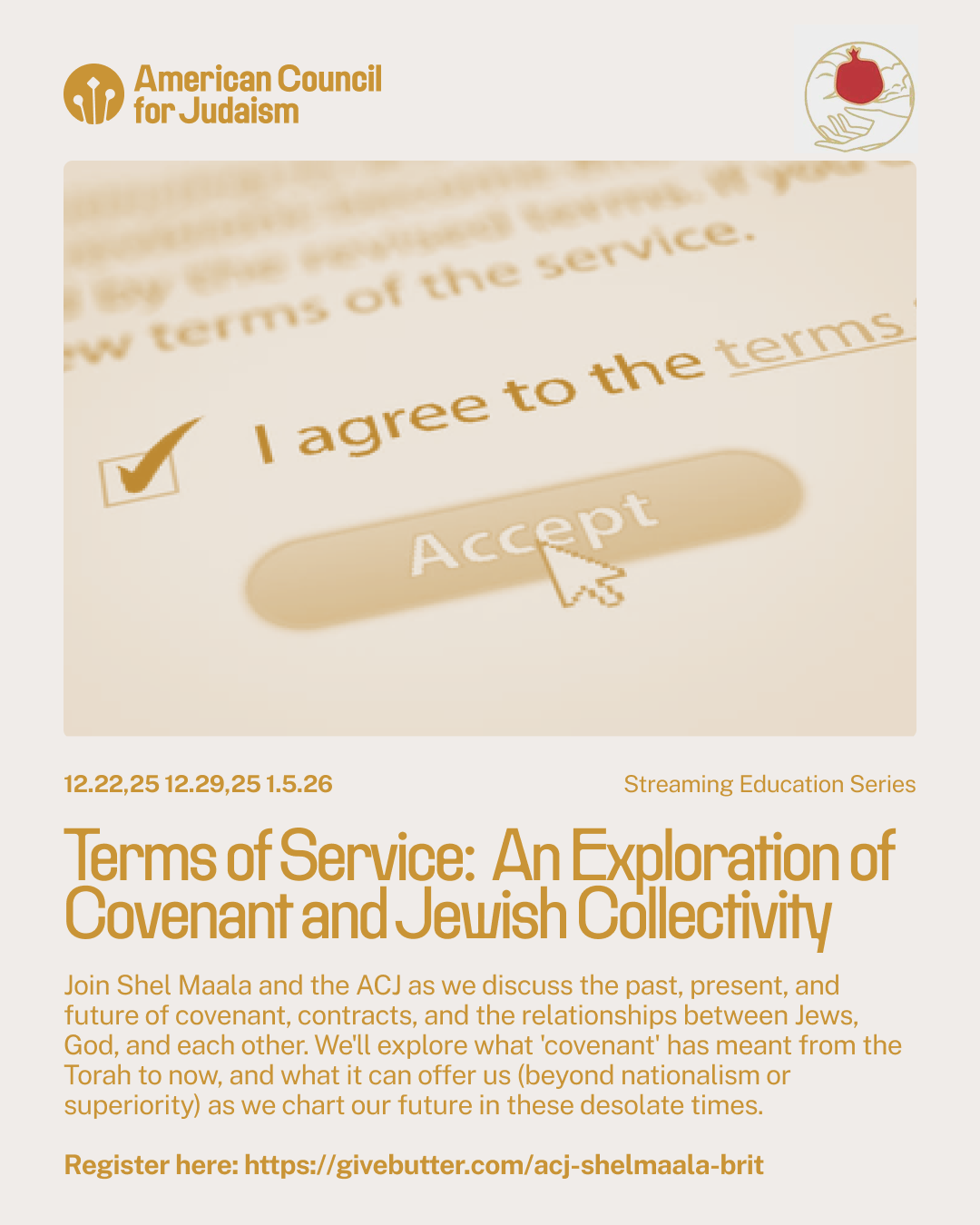Program
- Education Series
- Streaming
The Four Cubits: Building Your Own Jewish Practice
This 8-week guided journey is designed for those seeking to build a meaningful Jewish practice on their own terms. Grounded in the ACJ’s historic commitment to Judaism beyond nationalism, this course explores Jewish spirituality, practice, ethics.
Each week, we will engage with foundational Jewish practices while allowing space for personal interpretation, shared study, and integration. Participants will be encouraged to shape their own evolving Jewish path through intentional learning, reflection, and action.
Whether you are discovering Judaism for the first time or reclaiming traditions in a way that aligns with your values, this course provides a flexible and inclusive framework for deepening your Judaism.

An Introduction to Judaism Beyond Nationalism
Module 3: The Four Cubits: A Guide to Building your own Jewish Practice
Suggested Donation: $300
Summary:
This 8-week guided journey is designed for those seeking to build a meaningful Jewish practice on their own terms. Grounded in the ACJ’s historic commitment to Judaism beyond nationalism, this course explores Jewish spirituality, practice, ethics.
Each week, we will engage with foundational Jewish practices while allowing space for personal interpretation, shared study, and integration. Participants will be encouraged to shape their own evolving Jewish path through intentional learning, reflection, and action.
Whether you are discovering Judaism for the first time or reclaiming traditions in a way that aligns with your values, this course provides a flexible and inclusive framework for deepening your Judaism.
Week 1: Introduction to Neo-Halakhah
-
This opening session frames halakhah as “the way we walk,” a living and evolving language of Jewish practice and thought. Participants are introduced to core concepts, study models of halakhic reasoning, and encounter real teshuvot (responsa) on contemporary issues. The session closes with communal reflection, setting the foundation for a personal and communal journey over the coming weeks.
Week 2: Intentionality and Tools for Halakhic Exploration
-
Participants explore the sweep of Jewish textual history and learn how to navigate Sefaria to find classical, medieval, and modern sources. They begin using a Personal Halakhic Decision-Making Guide to shape their own Shabbat practice, grounding study in both tradition and personal experience.
Week 3: Shabbat
-
Through classical and contemporary texts, participants trace the evolution of Shabbat as a cornerstone of Jewish life. They refine their own Shabbat practice, explore tensions between rest, law, and community, and commit to experimenting with lived ritual over the week.
Week 4: Prayer
-
Focusing on Jewish prayer as an evolving communal technology, participants study sources from the Bible, rabbinic literature, and modern thinkers. They examine how their own prayer or meditation practices intersect with tradition and prepare to deepen their personal approaches.
Week 5: Torah and Wisdom
-
This session reframes Torah as an ongoing conversation rather than a fixed text. Participants encounter classical sources and modern poetry, selecting texts that resonate personally and exploring how engagement with Torah can shape their Jewish paths.
Week 6: Jewish Ethical Living
-
Participants explore mitzvot as a framework for ethical action in daily life. Through text study and personal reflection, they identify and commit to integrating one mitzvah or ethical practice—such as tzedakah, justice work, or kindness—into their lived practice.
Week 7: Food
-
Drawing from traditional sources and eco-kashrut teachings, participants examine Jewish food practices and their spiritual and cultural meanings. They apply halakhic reflection to their own food choices, experiment with a practice during the week, and reflect on the experience.
Week 8: Sharing Our Jewish Lives
-
In the final session, participants present their completed Halakhic Guide Sheets and personal practice plans, reflecting on how their understanding of halakhah has evolved. The session emphasizes halakhah as a lifelong, communal, and adaptable framework, and supports participants in identifying concrete next steps for continued learning and practice.
Related Programming

- Education Series
- Streaming
Judaism in Times of Fascism: An Eight Week Course on Theory and Practice
This course will provide students with a unique venue for this inquiry. Students will be introduced to key concepts, theories, and methods that can help us make sense of loaded terms like "Judaism," "fascism," and "antifascism"; to historical readings and case studies that illuminate the lineages of Jewish antifascism -- including anarchist, Bundist, liberal, and Marxist varieties -- as well as the lesser known histories of Jewish fascism; and to recent texts and other media that address the crisis within contemporary Judaism. Finally, the course will feature ample opportunities for open discussion, and will conclude with a consideration of the possibilities for an emancipatory Judaism and a world without fascism.
Learn More

- Education Series
- Streaming
Introduction to Judaism Beyond Nationalism Cohort 3
Introduction to Judaism Beyond Nationalism is a broad-stroke survey of Jewish life, culture, belief and non-belief, and the major ideas that have shaped Jews and Judaism across time. The course offers participants a grounding in the practices, philosophies, and expressions of Jewish life from the ancient world to the present.
The course is divided into two 8-week modules. A third module, focused on personal Jewish development and practice-building, will be offered after the conclusion of Module 2.
Recordings will be provided for anyone who cannot attend live. We encourage regular participation, while recognizing that life happens. The course pairs well with either Judaisms by Aaron Hahn Tapper or Jewish History: A Very Short Introduction by David Meyer.
Learn More

- Education Series
- Streaming
Terms of Service: An Exploration of Covenant and Jewish Collectivity
Join the ACJ and Shel Maala for a three work journey through the creation and development of the concept of brit, covenant, throughout Jewish history. We will explore its roots in the ancient Near East, its usage throughout Biblical and Rabbinic texts, and its usages, for good and for ill, in today's world.
All classes via Zoom, December 22nd, 29th, and January 5th from 6:30-8pm Eastern
Learn More